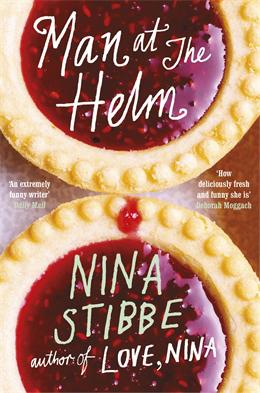I must say that reading Man at the Helm was quite a departure for me. As my boyfriend and, I’m sure, my readers will testify, I usually read sad/serious books. Apparently someone always dies and/or cries. There’s a fair bit of crying in Man at the Helm, and a small amount of death, but on the whole it’s a much cheerier book that the ones I usually read.
The main reason for this cheeriness is the cheeriness of Nina Stibbe. In nine-year-old Lizzie (excellent name choice) she has created one of the most believable and real-sounding child narrators I’ve ever come across. Lizzie’s narration in generally cheery, despite some serious ups and downs, and she, nor Stibbe, allows us to wallow in negativity. I very much agree with Lara Feigel’s review for The Independent, in which she says that “In other hands, the plot could be the stuff of chick-lit or the Aga saga, but what is brilliant here is the convincingness of the child’s point of view” and that “Telling the story from the child’s perspective allows the children’s values to dominate.” Feigel has exactly identified what it is that stops Man at the Helm from becoming too sentimental or cute, and that also adds credence to it being narrated by a child. This is always a tricky move, and if done badly can produce a cringe-worthy book that no one takes seriously. Stibbe, of course, manages to avoid this.

My proof copy.
Feigel’s review also states that the novel is semi-autobiographical – which accounts for not only the authenticity and likeability of Lizzie’s narration but also the authenticity of the story. While cheery it is really the story of a family having to reconstruct their entire lives, something that as a child of divorce I know to be a very unpleasant process. Though Lizzie keeps her chin up, and there is a lot of love and happiness in the book, the beginnings of it, the premise, are not particularly happy at all. But Stibbe saves it from misery by having Lizzie as her chipper narrator, and going back to Feigel’s review, this fact means that the values of Lizzie and her siblings are brought to the forefront. They are fundamental and simple – they want their mother, and themselves, to be happy. As children they aren’t fully aware of or do not completely comprehend the sometimes depressing nature of their situation, those things that make their mother drink, take antidepressants, and write her godawful plays. They do not see these things as an adult would – in all their gray misery – but rather as only children can. Problems that need to be solved. And that’s it. This charming simplicity saves the book from sadness, and for those of us to whom divorce is familiar, stops it from being too depressing to want to read.
Instead we are taken on a bit of a romp through a variety of slightly ridiculous situations that Lizzie manages to make seem normal thanks to her matter-of-fact turn of phrase and natural sense of humor. I laughed just because she made certain phrases sound funny, something which will appeal to those who like wordplay and have the ability to find humor in the mundanities of life. Such as:
We loved Mrs Vanderbus [their old neighbour] – I’m writing an extra line about her because of it. She often brought us home-made Dutch sugar cakes in pretty tins, which she always wanted back (the tins). And who, when she found a grass snake in the crocosmia, called us to see it and lifted it like a true expert even though she’d only ever seen one on the telly before and suffered a delayed panic attack approximately a week later and had to see Dr Hillward for a pill.
Laughing at Lizzie’s phrases and little side-stories felt like remembering the random and odd things that made you laugh as a child, that are in no way funny on their own, but have you in fits of giggles (usually with people who were there at the time) at the mere thought of them, years after the event. This is one of the joys of family, of being stuck with the same people all your life, so that you have all the same references and memories, and the same things to make you laugh. I don’t laugh with anyone as much as I laugh with my sister, remembering things like old teachers and that time she vomited in a cable car (sorry for mentioning that…). Some might accuse Stibbe of this novel being a bit cosy and familiar, but for someone who reads mostly about people who die (apparently), this is a good thing. Man at the Helm still has a lot of sadness, but it is everyday sadness, the sadness of the misfortunes of life that we all must live with everyday. It is not big dramatic sadness that people talk about for decades. It is the sadness of one family. And somehow that’s sadder than anything.
Some reviewers have commented on the fact that this book perpetuates the idea that a woman needs a man to be complete, and I did think about this once I’d finished the book. It is something to consider, but one must also consider the fact that this book is narrated by a child who just wants her mother and her family to be happy, and that she is mourning the loss of having parents that are still together. It is made very clear that Lizzie and her family are effectively shunned by their friends, and their new village, because of the divorce. Not only has their life changed dramatically, they are given no sympathy from anyone. From Lizzie and her sister’s point of view at least, they won’t be accepted again until they have a ‘complete’ family unit, i.e. a ‘man at the helm’. They look for one for their mother out of a desire for her happiness but also a desire for a return to some semblance of their old life. I think that Stibbe is aware of the issue of a woman ‘needing’ a man, and Lizzie makes a very clear point at the end of the book that a man is not always what is needed to be happy or to get along, and that some mothers cope fine on their own. Her and her sister’s search for a man at the helm is relative to their family, and it is what they want/think they need. A lot of the men they try out are also really crap, like their father, and this, coupled with their mother’s spur of self-betterment that happens in the last third of the book, only goes to show that a man cannot always help.

What an attractive cover. (image: penguin.co.uk)
My last note here will be about Debbie the dog. You know how there are mad cat people? I’m a mad dog person. I pretty much see them as people. So I cared about Debbie. She appears sporadically as a large, comforting presence, and I loved how Little Jack (Lizzie’s little brother) sat in her basket with her, and how when they have to move to a smaller house there is nowhere for her to stretch out and be alone “like a walrus”, and it is humiliating for all involved when she has to be taken for actual walks rather than just roam about the family land has she had done previously. She is a character in herself. Which is why I was pretty upset when she gets hit by a car. I just thought WHY. Why would this be in this book? But then maybe this happened to Nina Stibbe’s dog; maybe the children needed to experience the pain of worrying about her (she survives, don’t worry). It’s an upsetting episode and I wondered what its purpose was. But perhaps it was there to demonstrate the random cruelty of life, and the fact that despite this we (and dogs) can still pull through. Debbie is a bit “wonky” after her accident, and I suppose this is like a family after divorce. Still alive, still here, still good, but a bit wonky.
_
Published by Viking/Penguin on 28th August 2014. My copy was kindly provided by the publisher for review.
